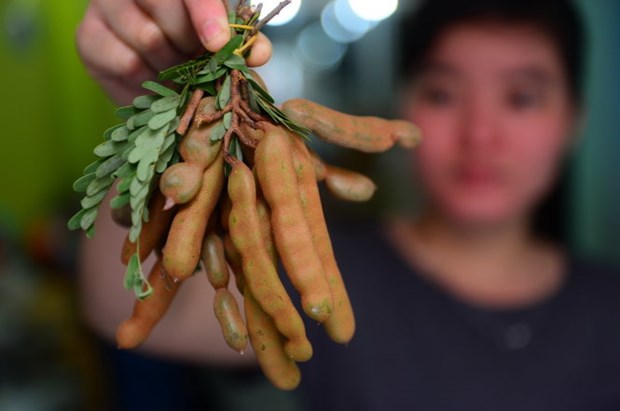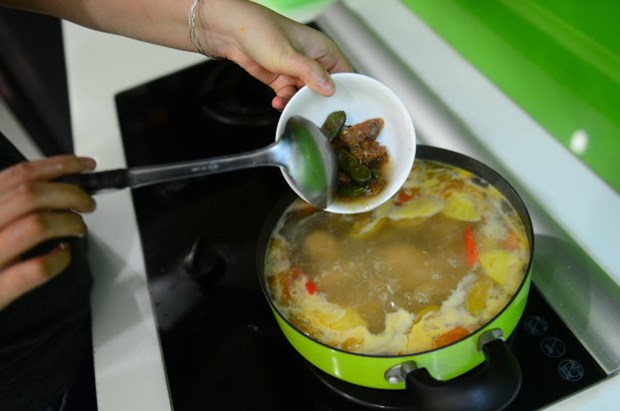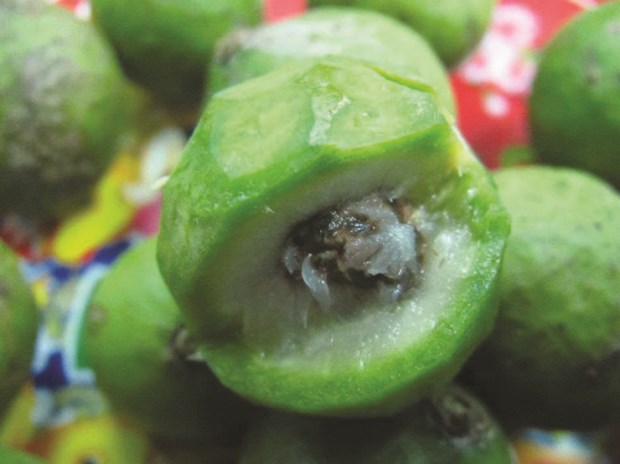
Sour tamarind.
Not
only in culinary world, images of tamarind and Sau are quite typical for their
regions. In the South of Vietnam, sweet and sour tamarind is one of vital
street food of students; on small streets, tamarind leaves simultaneously fall
on pavements; and the Canopy of Tamarind writing club used to be a pure pride
of writers and authors.
With
Northern people, Sau fruits have been playing an important role in their daily
lives, such as pickled Sau fruits in family meals, fresh ripe wild Sau fruits
from Cuc Phuong forests sold in Hom marke, and sweet and sour Sau fruits as
traditional feature gift of Ha Noi.
“Our childhood and
the sour Sau”
That
is a phrase in 10 years of missing (author Truong Nam Huong) that exiles would
often mumble, “So missed. Why is the evening rain incessant? Over there season
has changed in Ha Noi.”
The
winter usually changes in Lunar March along with small yet incessant rains.
After that period, the old Sau trees on Lo Duc or Phan Dinh Phung street (Ha
Noi) would be thrillingly blooming with milky white tiny flowers.
After
that, Sau fruits appear. Young Sau fruits are the best with a simple bowl of
soup. After boiling water spinach (Ipomoea aquatica), dropping some young
fruits into hot pot, waiting for the broth to be boiled again then gently
mashed them is to have a perfect soup for summer.
The
young fruits have yellowish skin, thin flesh, and transparent crunchy seeds.
Sau fruits make the broth turning yellowish, too.
The
flesh will be taken out and macerated in a small bowl of fish sauce together
with fresh chopped chili. The daily summer meal, which has sour soup, hot and
sour fish sauce, and one more main dish should be perfect.
The
peak season of Sau fruits is June, when the fruits get really mature with dark
scabrous skin. We can see Sau fruits in every corner of Ha Noi.
At
that time, seasonal dishes should be served in almost every restaurant, from
middle to high class. Popular dishes are cooked young ribs in Sau broth and
duck in Sau hot pot. Chopped young ribs are cooked with a dozen of grated Sau
fruits and a few bird chili, served with vegetables, mushrooms, tomatoes,
celery, and optional dried or fresh noodles. The pot should be impressively
robust with plentiful flavors, including special transparent sourness of Sau fruits,
mild spicy of chili, and aromatic smell of celery.
Definitely,
stewed duck and Sau fruits are perfect in harsh summer. Many household cooks
strongly said that the more Sau fruits are, the better the pot is because duck
is extremely good with mildly sour Sau fruits.
Totally
different from the hot pot, stewed duck has an irreplaceable taste, which is
from fresh ginger, nutty taro, and mildly acrid of water mimosa (Neptunia
oleracea). Ginger is to balance the cold effect of duck meat and Sau fruits while
water mimosa makes taro texture less fatty nutty. However, Sau fruits could not
be combined with crab paste in any circumstance because the mixture would not
be smooth or nice-looking.

Tamarind is prepared for a transparently sweet and sour flavor hot pot.
Southern tamarind
fruits
Absolutely
different from Sau fruits of the North, images of tamarind trees in the South
are really poetry. Seeing tiny tamarind leaves falling in the wind can
associate to a golden rain that famous musician Trinh Cong Son had written
about.
Tamarind
fruits are so common, from a casual snack to luxury dishes. Some popular
products from tamarind are pickled hot tamarind in licorice liquid, addictive
roasted peanut on tamarind juice, and especially, tamarind fish sauce. That type
of fish sauce is indispensable with certain types of food, especially fishy
food, such as grilled dried Bombay duck fish (Harpadon nehereus). Indeed,
tamarind fish sauce can go with any dishes because Southern people just love
its taste, and vice versus.
There
are no Sau trees in the South of Viet Nam; fermented rice and rice vinegar are
also not familiar with Southern people. Therefore, tamarind – together with
Giang leaves (Aganonerion polymorphum) are indispensable the sour-maker spices
in the kitchen here.
In
supermarkets, a prepared package of sour soup always goes with a pinch of
skinless tamarind. The sourness of tamarind is totally different from Sau’s. It
tastes smoother with a hint of sweetness. However, tamarind does not work very
well in boiling broth as Sau does. Sau fruits are specialized in featured
dishes, such as sweet pickles and salty pickles, or sweet and sour candies
while tamarind is served for quite common purposes.
Memories
have their own particular tastes, like Southern people miss their tamarind fish
sauce while Southern ones long to have a bowl of vegetable broth with mashed
Sau fruits.
Simply
that’s the taste of hometown.

Sau fruits in Ha Noi.
Expert
housewives would wait until peak season, when Sau fruits reach their best maturity
and the price is the most reasonable, to get up to 10 kilograms of Sau fruits.
Those fruits will be grated, soaked in slaked lime liquid then divided into 2
containers, which one is sugar dipping and the other is chili fish sauce
dipping. Sugared Sau juice is a legendary cooler for anyone who has spent a day
in harsh summer of Ha Noi and salty pickled Sau fruits are great side dish from
summer to the end of a year. The longer Sau fruits stay in containers, the
better the taste is because fish sauce (or sugar) liquid has been absorbing all
the flavors of Sau fruits and chili that make a simple yet irresistible sauce
in every daily meal.
Writer: Cat Khue/Tuoitrecuoituan
Translator: Thu Pham